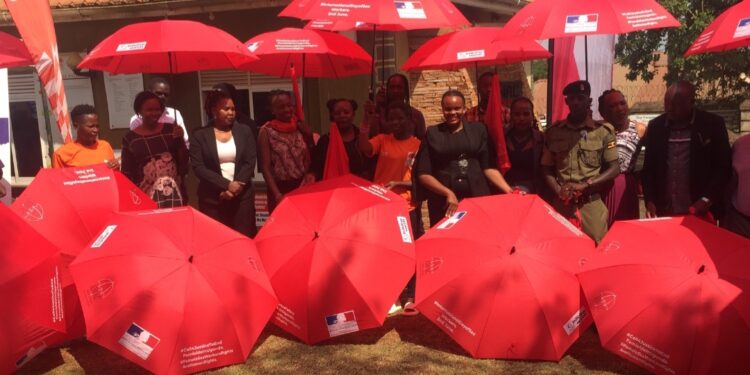In the wake of alarming rates of violence against marginalized women, including sex workers, the Alliance of Women Advocating for Change (AWAC) in Uganda has intensified its call for authorities to prioritize their protection and rights.
Led by Kyomya Macklean, the Executive Director, AWAC emphasizes the urgent need for decriminalizing sex work to alleviate stigma, social exclusion, and the pervasive fear of violence faced by sex workers.
Speaking to the press on Tuesday, commemorating the post-international Sex Workers Day, Macklean highlighted the harrowing reality of targeted violence against sex workers. She pointed out the tragic cases of several sex workers who were mysteriously killed between October 2023 and February 2024 in Sembabule, Wakiso, and Kampala Districts. Shockingly, despite the scale of these atrocities, justice remains elusive for their families.
Macklean stressed that ensuring the safety and well-being of sex workers is not only a moral obligation but also a crucial step towards achieving sustainable development goals and combating HIV/AIDS.
Citing statistics from various sources, including the Uganda Police annual crime report of 2022 and the Demographic and Health Survey of 2016, she underscored the disproportionate burden of gender-based violence (GBV) faced by women, particularly sex workers.
According to Macklean, the criminalized environment in which female sex workers operate exacerbates their vulnerability to GBV, HIV infection, stigma, discrimination, and mental health issues. She referenced a study conducted in the post-conflict Gulu district, revealing alarming rates of depression among female sex workers.
Macklean called upon the government and the Ministry of Health to expand mental health programs to address the psychological well-being of marginalized communities effectively. Additionally, she urged comprehensive sensitization programs for state officials on human rights and the imperative of ensuring justice and protection for all citizens, irrespective of their occupation.
In advocating for inclusive development initiatives, Macklean emphasized the importance of involving sex workers in government projects such as the parish development model and NAADs programs. She highlighted the existence of sex worker-owned Savings and Credit Cooperative Societies (SACCOS) as evidence of their potential contribution to the nation’s development agenda.
As AWAC Uganda continues its crusade for the rights of marginalized women, especially sex workers, Macklean’s impassioned plea serves as a poignant reminder of the urgent need for concerted action to address systemic injustices and ensure a safer, more equitable society for all.
Murder of Sex Workers
During this year’s Women’s Day commemoration, Nakirya Miria, a female sex worker from Ssembabule district, shared a harrowing account of the past four months, marked by the tragic killings of her colleagues.
The nightmare began on November 15, 2023, when they discovered the lifeless body of their colleague, Annet Nantingo, in her room. Nakirya recounted the distressing response from both bystanders and law enforcement: “Despite our alarm and the arrival of authorities, the prevailing sentiment was accusatory. There were insinuations that she may have provoked her own demise, allegedly through theft from a client. We vehemently countered that even if such allegations were true, resorting to violence was unjustifiable; legal channels should have been pursued.”
A month later, on December 16, Nakirya tragically recounted another colleague’s death, discovered with her one-year and eight-month-old baby crying plaintively beside her. “The cruel irony of her demise compounded our grief. We questioned whether her murder was similarly attributed to perceived transgressions.”
Then, on January 16, Nakirya mourned the loss of yet another neighbour and fellow sex worker, Najjuko Promise, under eerily similar circumstances, leaving behind an eight-month-old infant. Each tragedy echoed the last, highlighting a pattern of violence that targeted vulnerable women within their community.
Nakirya’s testimony was delivered during a community dialogue organized by the Alliance of Women Advocating for Change (AWAC) as part of the International Women’s Day commemoration. Her chilling account underscored the urgent need for greater protection and justice for marginalized women, including sex workers, who are disproportionately vulnerable to violence and exploitation.
The law and Police
Kamagara Editah, a dedicated human rights defender and advocate at AWAC, highlighted a concerning trend of police abuse against sex workers, with perpetrators often escaping legal repercussions.
“Despite being innocent, sex workers frequently face unjust treatment at the hands of law enforcement, yet their assailants evade accountability,” noted Editah. “Many of these women engage in sex work out of necessity to provide for their families, yet they endure pervasive discrimination from society at large, extending from the grassroots level to the upper echelons of government. This entrenched bias makes it challenging for their voices to be heard. Nevertheless, our commitment to their cause remains steadfast, and fostering a shift in societal attitudes is paramount. It’s imperative that people recognize sex workers not as criminals but as individuals striving for survival. It’s baffling that the government allocates funds to support various groups but overlooks the plight of sex workers.”
Corporal Conrad Muzoora, serving as the Kawempe Community Liaison Officer, acknowledged the need for a change in mindset within the police force. “Mindset change is an essential campaign that demands implementation,” affirmed Muzoora. “I view these individuals as heroes who labour diligently to sustain their families. Through their organization, they have demonstrated financial prudence by establishing Savings and Credit Cooperative Societies (SACCOs), illustrating their resilience and capacity to contribute positively to society. We must reject discrimination against them.”
Muzoora, however, emphasized the importance of sex workers adhering to the law and exhibiting respect. “While advocating for their rights, it’s essential for sex workers to uphold legal standards and refrain from activities such as drug abuse and theft,” he advised. “Law enforcement’s role is to uphold the law, and instances where individuals are brought into custody typically stem from violations thereof, not solely based on their profession. We aim to ensure public safety and address criminal behaviour, not target individuals based on their occupation.”
Meanwhile, International Sex Workers’ Day, observed annually on June 2nd, pays tribute to sex workers worldwide, shedding light on their frequently exploited working environments. The origins of this commemoration trace back to the occupation of Église Saint-Nizier in Lyon by over a hundred sex workers on June 2, 1975. Their courageous act aimed to spotlight the inhumane conditions they faced in their profession. Since then, this significant day has been honoured each year, starting from 1976. In German, it is referred to as “Hurentag” (Whore’s Day).
Do you have a story in your community or an opinion to share with us: Email us at editorial@watchdoguganda.com













